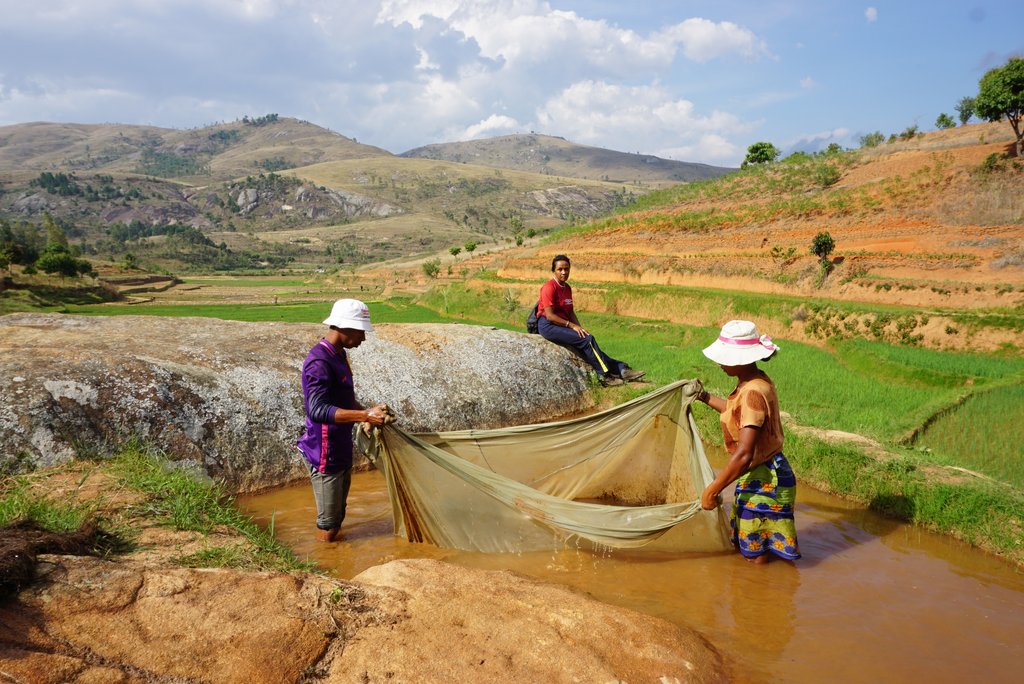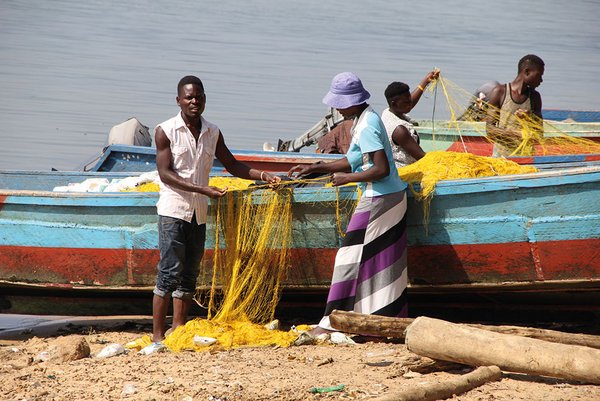 Read this article in French
Read this article in French
 Download this article in magazine layout
Download this article in magazine layout
- Share this article
- Subscribe to our newsletter
Thinking terrestrial and aquatic food systems together
On land and below water, the world seems to be out of balance and the Covid-19 pandemic has revealed and exacerbated existing problems in international food systems. The recent UN Food Systems Summit acts as a wake-up call and stresses the need for systemic transformations in various sectors and settings. Fisheries and aquaculture are part of the problem and part of the solution. Fish stocks have never been under such stress as they are today. Never have so many aquatic species been threatened by extinction. At the same time, we have the knowledge, tools and technologies to manage and govern aquatic systems more sustainably. Their use would actually increase the productivity of aquatic systems and contribute to better nutrition and to securing the livelihoods of hundreds of millions of people world-wide.
Today, although 80 per cent of the fishery and aquaculture products consumed across the world come from the territorial waters of developing countries, their average per-capita fish consumption is only half of that in developed countries (20.5 kg). Fish trade and the granting of fishing rights represent important revenue streams for many developing countries. However, at the same time, export can divert fish away from domestic consumption, and with it the possibility of fighting hunger and malnutrition more effectively. In Africa and other regions with high food insecurity, scenarios for future fish demand far exceed the current domestic supply. There is an urgent need for action to meet this increasing demand in a sustainable manner as part of the global fight against hunger and malnutrition.
Commitments, instruments and partnerships of German development cooperation
The Sustainable Development Goals, specifically SDG 1, 2 and 14, as well as guidelines and agreements endorsed by the UN Food and Agriculture Organization (FAO) and its member states constitute important principles and standards of actions for our programme planning and implementation. On this basis, the German Federal Ministry for Economic Cooperation and Development (BMZ) undertakes efforts to promote sustainable artisanal fishing and aquaculture, encourage sustainable, socially responsible processing and marketing of fish, and, in line with the European Union’s zero tolerance approach, support the efforts of partner countries to tackle illegal, unreported, and unregulated (IUU) fishing.
German development cooperation in the field of fisheries and aquaculture relies on various instruments. These include bilateral technical and financial development cooperation. In Mauritania, for example, the BMZ supports the development of effective fisheries surveillance and monitoring systems as well as port facilities and fish landing sites. But we also support global initiatives such as the Global Sustainable Seafood Initiative (GSSI) and the Fisheries Transparency Initiative (FiTI, see article "Sustainable fisheries need transparency") and collaborate with international or non-governmental organisations.
The Global Programme “Sustainable Fisheries and Aquaculture”
With the Global Programme “Sustainable Fisheries and Aquaculture” (2016–2024), operating in seven countries in Africa and Asia, German development cooperation is working closely with thousands of stakeholders along fisheries and aquaculture value chains (see examples provided in the boxes). The target group includes small- and medium-sized aquaculture producers, fishers, processors, traders, producer organisations, research and training institutes as well as governmental organisations. The Global Programme provides technical training and business development services to sustainably increase production and gain market access. Innovations such as hygienic steel processing tables or steel boxes on boats protect the fish from dirt, sunlight and mechanical damage. This reduces post-harvest losses and increases the availability of fish on local markets. Public, private, and non-governmental organisations are supported to disseminate demand-oriented advisory services and best practices. Policy advice is offered to improve legal frameworks and their enforcement. For example, six countries have implemented a total of 28 measures for sustainable fisheries and aquaculture in accordance with the FAO guidelines. This includes revising national strategies and developing relevant implementation and action plans. Almost 20,000 people have participated in trainings on business management and technical skills. Participants learn how to avoid overfishing or how to produce and process fish resource-efficiently. About 9,100 aquaculture businesses have increased their production capacity. The amount of legally caught fish available for the food-insecure population has more than doubled.
PROMOTING SUSTAINABLE FISHERIES IN UGANDA
The Nile perch fishery in Lake Victoria is one of Africa’s most important value chains. It contributes to the livelihoods of two million people in the region. But this important source of nutritious food and income for the people around Lake Victoria is under threat. Open access to fish stocks, illegal, unreported, and unregulated (IUU) fishing and a lack of a sufficient supervisory and monitoring system for the laws and regulations applicable to the fisheries sector add to the pressure on the resource. To tackle this issue, as part of the Global Programme “Sustainable Fisheries and Aquaculture”, around 12,900 boats have been registered and 25,800 fishers have received fishing licenses to formalise their businesses. In addition, more than 700 inspections have taken place to reduce IUU fishing. So far, more than 40,300 tons of wild catch from Lake Victoria has been regulated and documented in Uganda.
In the last years, BMZ has fostered new and existing partnerships. For instance, we have initiated a collaborative scheme with the Initiative Stop Illegal Fishing (SIF) to support the implementation of the Port State Measurement Agreement (PSMA) to target IUU fishing in Ghana, Madagascar, and Mozambique. In the fight against IUU fishing, we consider it important to have international recommendations to counter the negative implications of transshipment, the unloading of fish at sea from one boat to another as a possible loophole for legalising illegal fish. We therefore support the development of the FAO Transshipment Guidelines.
In the area of direct value chain support, the BMZ supports the EU-funded and FAO-led Fish4ACP project. It serves to promote sustainable value chain interventions in fisheries and aquaculture in twelve selected countries in Africa, the Caribbean and the Pacific. In 2020, together with the EU and FAO, the BMZ organised a policy event to discuss the importance of sustainable fisheries and aquaculture for food and nutrition security in Africa and to emphasise the urgency for substantial and collaborative sector support.
SUSTAINABLE RICE-FISH FARMING IN MADAGASCAR
In Madagascar, rice-fish farming has great potential to sustainably improve local livelihoods, especially in rural areas and inland. Around 80 per cent of the population live there, and many people suffer from food insecurity and malnutrition. Better access to fish, which is mainly traded along the coast and in cities, has important economic benefits and improves food security and nutrition in the interior of the country. To date, only 20 per cent of suitable fields are used for ricefish cultivation. To expand this integrated aquaculture approach, the Global Programme “Sustainable Fisheries and Aquaculture” supports the Malagasy government in creating favourable political, legal, and administrative frameworks. In addition, the programme has already trained 15,000 people in rice-fish farming through trainings and practical demonstrations. Successful application creates several advantages. Fish find an optimal habitat in the rice fields and feed on naturally occurring snails, insects and weeds. In search for food, they churn up the soil and release nutrients for the rice plants. In addition to improving fish production, this increases the rice yield.
(Photo: Sabine Wolf/ GIZ/ Global Programme “Sustainable Fisheries and Aquaculture”)
National and international momentum
BMZ’s financial and political commitment in the fisheries and aquaculture sector has continuously grown over time. Fisheries and aquaculture will remain important sectors in the context of ending hunger and protecting life on Earth, the environment and natural resources. Given its relevance in global trade, the fish value chain should be considered next-in-line to be given similar attention as other classic commodities, e.g. bananas, cocoa and coffee.
I am confident that the outcomes of the UN Food Systems Summit will guide the much-needed transformation of how we think, produce and consume foods. The Summit has made it clear that a systematic approach means to think terrestrial and aquatic food systems together. For too long, “blue foods” and the people who catch, collect, or produce these sustainably have been decoupled from discourses, policies and support in agriculture and other sectors. That is surprising when you consider that 90 per cent of the more than 200 million people directly and indirectly employed in the sector live in developing countries, with small-scale fisheries accounting for 50 per cent of the global fish landings. The UN International Year of Artisanal Fisheries and Aquaculture (IYAFA) in 2022 (see article "Small in size – big in value. Celebrating small-scale artisanal fisheries and aquaculture in 2022") will help to hold up the momentum of an increasing global awareness of the sector’s importance. However, recognition alone is not enough, it must lead to better support. Urgency is required, because global crises such as climate change are threatening the resilience of aquatic livelihoods and our food systems.
Martin Hoppe is Head of the Division for Food and Nutrition Security, Global Food Policy, Fisheries at the German Federal Ministry for Economic Cooperation and Development (BMZ).
Contact: RL123@bmz.bund.de




